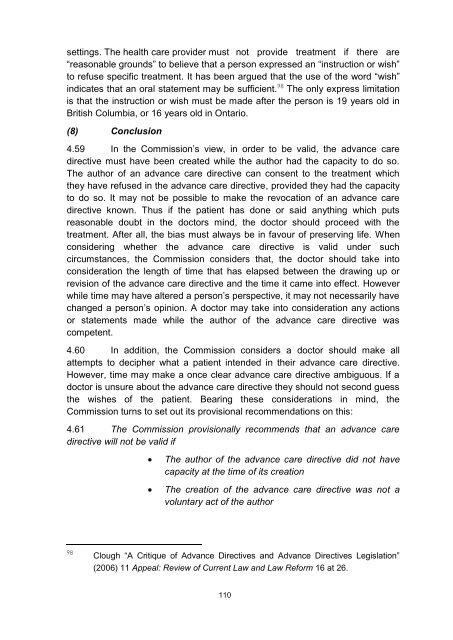Consultation Paper on Bioethics - Law Reform Commission
Consultation Paper on Bioethics - Law Reform Commission
Consultation Paper on Bioethics - Law Reform Commission
You also want an ePaper? Increase the reach of your titles
YUMPU automatically turns print PDFs into web optimized ePapers that Google loves.
settings. The health care provider must not provide treatment if there are<br />
“reas<strong>on</strong>able grounds” to believe that a pers<strong>on</strong> expressed an “instructi<strong>on</strong> or wish”<br />
to refuse specific treatment. It has been argued that the use of the word “wish”<br />
indicates that an oral statement may be sufficient. 98 The <strong>on</strong>ly express limitati<strong>on</strong><br />
is that the instructi<strong>on</strong> or wish must be made after the pers<strong>on</strong> is 19 years old in<br />
British Columbia, or 16 years old in Ontario.<br />
(8) C<strong>on</strong>clusi<strong>on</strong><br />
4.59 In the Commissi<strong>on</strong>‟s view, in order to be valid, the advance care<br />
directive must have been created while the author had the capacity to do so.<br />
The author of an advance care directive can c<strong>on</strong>sent to the treatment which<br />
they have refused in the advance care directive, provided they had the capacity<br />
to do so. It may not be possible to make the revocati<strong>on</strong> of an advance care<br />
directive known. Thus if the patient has d<strong>on</strong>e or said anything which puts<br />
reas<strong>on</strong>able doubt in the doctors mind, the doctor should proceed with the<br />
treatment. After all, the bias must always be in favour of preserving life. When<br />
c<strong>on</strong>sidering whether the advance care directive is valid under such<br />
circumstances, the Commissi<strong>on</strong> c<strong>on</strong>siders that, the doctor should take into<br />
c<strong>on</strong>siderati<strong>on</strong> the length of time that has elapsed between the drawing up or<br />
revisi<strong>on</strong> of the advance care directive and the time it came into effect. However<br />
while time may have altered a pers<strong>on</strong>‟s perspective, it may not necessarily have<br />
changed a pers<strong>on</strong>‟s opini<strong>on</strong>. A doctor may take into c<strong>on</strong>siderati<strong>on</strong> any acti<strong>on</strong>s<br />
or statements made while the author of the advance care directive was<br />
competent.<br />
4.60 In additi<strong>on</strong>, the Commissi<strong>on</strong> c<strong>on</strong>siders a doctor should make all<br />
attempts to decipher what a patient intended in their advance care directive.<br />
However, time may make a <strong>on</strong>ce clear advance care directive ambiguous. If a<br />
doctor is unsure about the advance care directive they should not sec<strong>on</strong>d guess<br />
the wishes of the patient. Bearing these c<strong>on</strong>siderati<strong>on</strong>s in mind, the<br />
Commissi<strong>on</strong> turns to set out its provisi<strong>on</strong>al recommendati<strong>on</strong>s <strong>on</strong> this:<br />
4.61 The Commissi<strong>on</strong> provisi<strong>on</strong>ally recommends that an advance care<br />
directive will not be valid if<br />
The author of the advance care directive did not have<br />
capacity at the time of its creati<strong>on</strong><br />
The creati<strong>on</strong> of the advance care directive was not a<br />
voluntary act of the author<br />
98 Clough “A Critique of Advance Directives and Advance Directives Legislati<strong>on</strong>”<br />
(2006) 11 Appeal: Review of Current <strong>Law</strong> and <strong>Law</strong> <strong>Reform</strong> 16 at 26.<br />
110

















